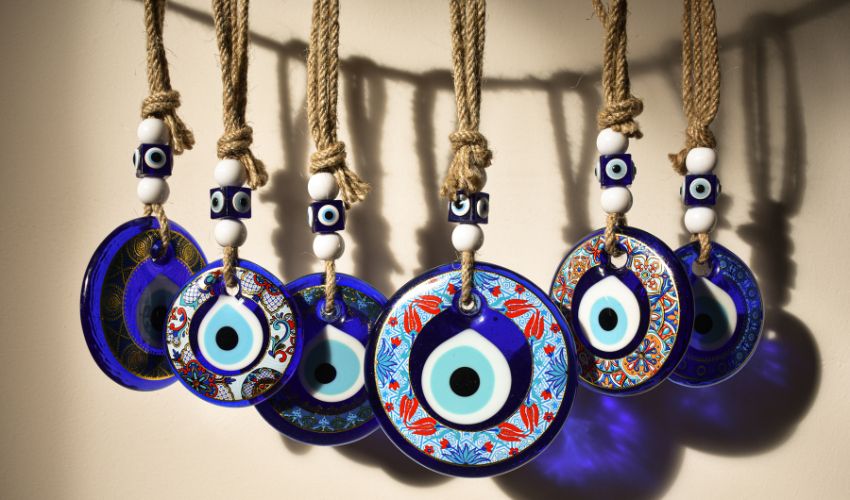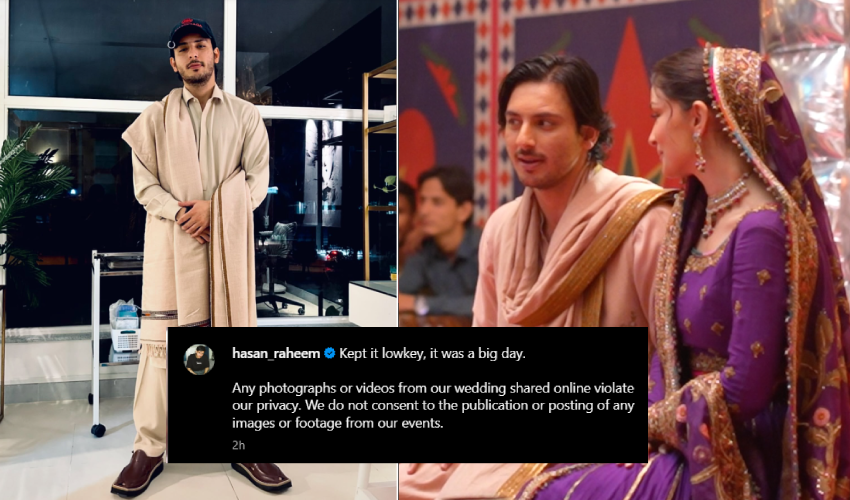In the fast-paced flow of social media timelines, where every success, achievement and happiness is hastily shared, an old belief lurks quietly in the shadows: the influence of the evil eye, or "nazar."
Despite the apparent contrast between the digital era and such superstitions, this age-old idea, based on jealousy, envy and admiration, still holds a surprisingly strong sway over how we manage our virtual and real-life experiences. It serves as a subtle indication that even in our most contemporary interactions, the echoes of ancient anxieties and beliefs remain closely intertwined with our everyday existence.
The concept of "nazar" is deeply entrenched in various cultures and is believed to bring about misfortune through envious looks or excessive admiration impacting the health, wealth, and overall well-being of those it targets. This belief is not limited to Pakistan only, but is spread across the Middle East and Europe as well.
The evil eye, often represented by four concentric circles, has its roots in ancient Greece and Rome. In Islam, the evil eye is considered real, and there are prescribed prayers for safeguarding against it. Hinduism and Buddhism also incorporate rituals to fend off the evil eye, and it is acknowledged in the Bible as well, illustrating its widespread impact.
As a result, ‘protective’ measures such as wearing amulets, reciting prayers, or practicing specific rituals are thought to ward off this unseen ‘threat’.
For example, in South Asia, black dots on children's foreheads or chili and lemon garlands could be seen at the entrances of homes to keep away the evil eye. Over in Mediterranean cultures, the blue, white and black "evil eye" amulet is a prevalent symbol of protection, often worn as jewelry or incorporated into home decor.
Our lives are exposed to a wide audience on social media platforms such as Instagram, Facebook, and TikTok, including people we barely know. While this exposure enables self-expression and connection-building, it also leaves us open to the effects of "nazar." Sharing our achievements, vacations, and important life events inadvertently invites the judgment and envy of others, potentially resulting in negative consequences.
Even celebrities are becoming more aware of the pitfalls of social media, which has become ubiquitous. Their cautious online presence demonstrates a willingness to preserve their privacy and well-being.
American singer Selena Gomez has spoken out about her mental health issues and the effect of social media. She has said, "Social media has been tremendously bad for my generation... I usually get the impression that I'm seeing things I don't want to see or comparing myself to others.
In similar vein, actress Ayeza Khan has publicly admitted that the notion of "nazar" drives her social media conduct. She has stated, "I am really cautious about posting photos of my family, particularly my children, since I believe in the evil eye. I do not want to draw unwanted attention or envy."
British singer Adele is similarly cautious about her social media presence. She said, "I'm not particularly good at being active on social media... I'd rather be mysterious and keep my privacy.
The concept of "nazar" intersects with modern psychology, especially in the context of social media. Research published in the journal ‘Cyberpsychology, Behavior, and Social Networking’ indicates that social media is a fertile ground for envy and jealousy. Individuals who spend more time on these platforms are more likely to experience feelings of envy, leading to the "envy spiral" where carefully curated images of others' success and happiness spark unfavorable comparisons, causing resentment and dissatisfaction.
A study in the ‘Journal of Social and Clinical Psychology’ further delved into the link between social media usage and mental well-being, finding that restricting social media use to just 30 minutes a day significantly reduces feelings of loneliness and depression. This implies that excessive social media use not only heightens feelings of inadequacy but also worsens susceptibility to negative emotions like jealousy, which can be seen as "nazar" in cultures that believe in the evil eye.
"Nazar" can be seen as both a cultural and psychological phenomenon, involving the self-fulfilling prophecy. If individuals strongly believe they are vulnerable to the evil eye, they may unknowingly behave in ways that support this belief, thus increasing the chances of negative consequences.
At the core of the "nazar" belief is the notion that others may hold negative feelings, even unintentionally, towards those who appear to be successful. This belief becomes even more influential in settings where social comparison is prevalent, such as on social media.
While the impact of "nazar" cannot be completely disregarded, it is crucial to approach it with a critical mindset. Promoting a mindset that values critical thinking and self-awareness can assist individuals in better comprehending the emotional and cognitive processes at play. By promoting positive social interactions and reducing the emphasis on comparison, the emotional triggers that lead to envy and jealousy -- and consequently, the fear of "nazar" -- can be minimized.
The notion that jealousy alone has the power to cause harm may lead people to excessively limit their social interactions, especially online. This cautious approach could result in decreased social media involvement, reduced sharing of personal accomplishments, and a growing atmosphere of suspicion -- further immersing us in the very fears that "nazar" represents.
By understanding the psychological foundations of this belief and advocating for positive, mindful interactions, we can start to unravel the threads of superstition and cultivate a more open, trusting digital community.
The writer is a student of BS Digital Media and Communication at the University of the Punjab.



























